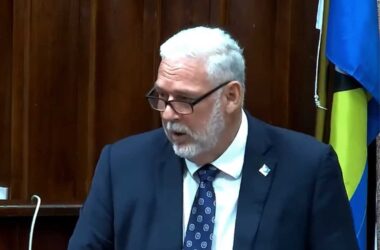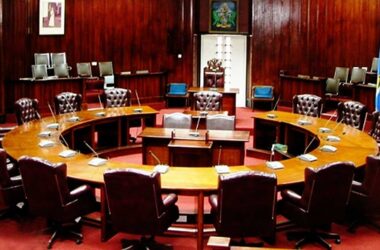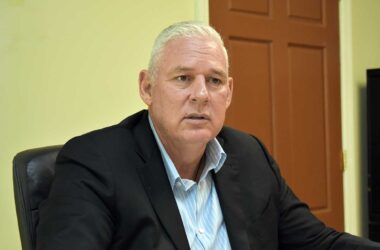
NEVER-MIND being overly underestimated by critics yet to fully-appreciate its positive roles in quiet management of the processes leading to a peaceful transition to a new ‘government’ in Haiti earlier this week, and tempering the noises in the Guyana-Venezuela controversy ahead of heady elections in Caracas in July, the Caribbean Community (CARICOM) continues demonstrating it can be counted-on to break-the-ice when it matters, including in global diplomatic deadlocks.
CARICOM member-states last week quietly agreed to recognize Palestine as a state.
Guyana, as Chair of CARICOM, welcomed and hosted United Nations (UN) and Palestinian representatives in Georgetown and issued a statement supporting the Palestinian Authority (PA) being elevated from its current ‘Observer’ status.
Guyana, as President of the UN Security Council at the time, had earlier donated to food aid for Gaza and joined member-states’ efforts to recognize Palestine as a full member-state – and with equal rights as Israel, which got UN recognition in 1967 through the same process now being denied Palestine.
Guyana’s statement was also echoed by others from Barbados, Jamaica and other member-states.
The CARICOM member-states’ decision to recognize and establish bilateral ties with the PA has certainly up-ended the endless efforts by the US to continue its decades-old prevention of UN recognition of Palestine.
Just last week, the UN General Assembly and Security Council were ready to finally upgrade Palestine’s status from Observer to Full Member, but were (again) blocked by US veto.
Even though Washington claims to support ‘a two-state solution’ to unending crisis facing Palestine at the hands of Israel since Israel started grabbing its lands in 1948, the US steadfastly refuses to allow Palestine to become a state.
The US insists on using its veto (as a Permanent Member) against any fair vote it doesn’t agree to, shifting goalposts where deemed necessary and engaging plausible deniability to continue supporting its allies in pursuit of its ‘national interests’ abroad.
In Cuba’s case, in 1972 (before CARICOM was established) four newly-independent Caribbean nations (Barbados, Guyana, Jamaica and Trinidad & Tobago) together recognized Havana, breaking the continental and international embargo imposed by Washington after the failure of the US-backed 1961 Bay of Pigs (Playa Giron) invasion and the 1962 declaration the revolution wanted to build ‘socialism’.
CARICOM adopted and has maintained that position of collective recognition of and support for Cuba’s right to self-determination for all of its five decades.
It’s member-states vote consistently every year, with the rest of the world, against the six-decades-old embargo and related sanctions, blockades and other measures aimed at lowering the quality of life on the most-embargoes island on Planet Earth.
In its efforts to force regime change in Cuba from without and within, Washington (under both Republican and Democratic administrations) has, for 63 years subjected ordinary Cuban citizens to sub-human and unequal status, condemned to starvation and eternal misery in global isolation.
Never mind then-outgoing US President Barack Obama’s positive decision to make a private visit with First Lady Michelle just days before leaving the White House, no US president has come even-close to supporting lifting of the heaviest sanctions imposed by Washington.
Indeed, President Donald Trump added Cuba to America’s home-grown ‘list’ of nations Uncle Sam wants the world to believe are ‘exporters of terrorism’ and ‘axes of evil’ – and President Joe Biden hasn’t even looked at it…
There’s growing support among Americans for normalization with Cuba, including in the US House and Senate, but the high-prized and priceless electoral value of the large anti-Cuba exile population in Florida always outweighs either party’s will for a diplomatic solution.
Throughout it all, however, Cuba has been a grateful friend to its CARICOM neighbours, never relenting in its provision of health, education and other forms of bilateral and multilateral assistance through free annual scholarships and through the over-three-decades-old Cuba-CARICOM trade pact.
Latin American and Caribbean ties also continue to be strengthened and/or resumed by CARICOM at various levels in the face of continuing external political and economic, social, diplomatic and commercial pressures from global partners mainly in Europe and North America.
The 23rd ALBA-TCP summit was hosted by Venezuela on April 24 and attended by several CARICOM leaders, who reaffirmed their governments’ commitments to the Latin American and Caribbean political and trade alliance.
ALBA-TCP – like the wider Community of Latin American and Caribbean States (CELAC) – brings together English and Spanish-speaking member-states from the Caribbean’s island-region and the South American mainland.
The ALBA-TCP leaders discussed ‘The 2030 Strategic Agenda’ that guides the path to be followed in their search for sustainable development of member-states in the coming years, in social, economic, political and cultural areas of mutual interest.
Saint Lucia’s Prime Minister Philip J. Pierre, who attended, said his nation and people are “friends of peace” who “condemn interference” and also “fight against poverty and climate change.”
Pierre rejected sanctions against Cuba and Venezuela as “unfair and unnecessary” and called for them be “eliminated in all countries.”
On Haiti, he called for “cessation of hostilities” there, “where citizens also have the right to exist and to live.”
The Saint Lucia leader, approaching his third year in office on July 26, advocated “reinforcing food security” and “improving air transport links” among ALBA-TCP island-nations.
He identified “improved regional air interconnection” and “food security” as both being “of high importance” for the Caribbean and Latin American island nations and appealed for advancing negotiations with Venezuela’s ‘Conviasa’ airline, to establish more and regular flight routes.
Pierre said such air links can also promote the tourism industries of Barbados, Bolivia, Cuba, Saint Vincent and the Grenadines and Venezuela, among others.
The Saint Lucia PM, whose ruling Saint Lucia Labour Party (SLP) won a 13-4 victory in 2021 that soon metamorphosed into a 15-2 majority in the 17-member national parliament, said ALBA-
TCP “can count on the participation of Saint Lucia in all actions for regional survival and advancement.”
He also wished success to the Venezuelan president, Nicolás Maduro, in the upcoming national elections.











